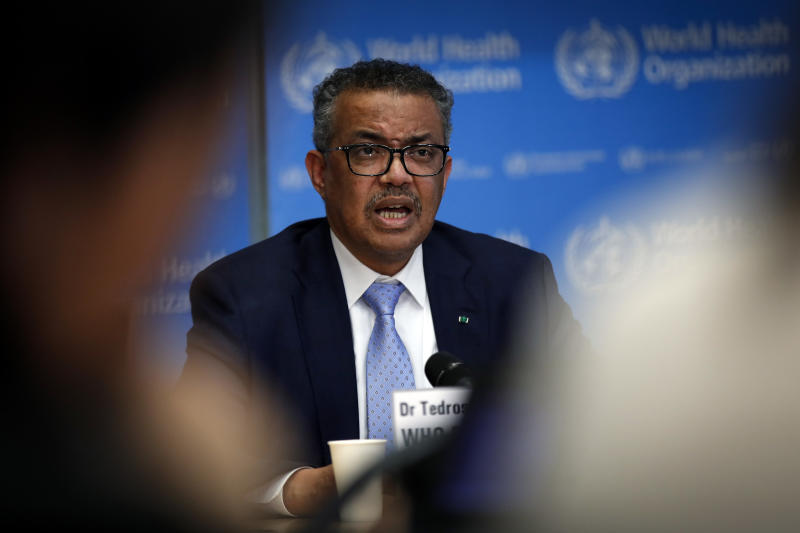Coronavirus spreading fast outside China but stigma is more dangerous: WHO
Sign up now: Get ST's newsletters delivered to your inbox

Director general of the World Health Organisation Tedros Adhanom Ghebreyesus speaks during a news conference on the coronavirus in Geneva, Switzerland, on March 2, 2020.
PHOTO: BLOOMBERG
Follow topic:
GENEVA (REUTERS) - The new coronavirus now appears to be spreading much more rapidly outside China than within but can still be contained, and stigma is more dangerous than the disease itself, the World Health Organisation (WHO) said on Monday (March 2).
WHO chief Tedros Adhanom Ghebreyesus said almost eight times as many cases had been reported outside China as inside in the previous 24 hours, adding that the risk of coronavirus spreading was now very high at a global level.
He said outbreaks in South Korea, Italy, Iran and Japan were the greatest concern, but that there was evidence that close surveillance was working in South Korea, the worst affected country outside China, and the epidemic could be contained there.
"Stigma, to be honest, is more dangerous than the virus itself. Let's really underline that. Stigma is the most dangerous enemy," he told a news briefing in Geneva.
He said the fight against the coronavirus should become a bridge for peace, commending the United States for supporting sending medical aid to Iran despite the tensions between them.
"I think we have a common enemy now," he said.
The global death toll exceeded 3,000, with the number of dead in Italy jumping by 18 to 52.
Latvia, Saudi Arabia, Senegal and Morocco reported cases for the first time, bringing the total to more than 60 countries with the illness known as Covide-19.
"We are in uncharted territory - we have never seen before a respiratory pathogen that is capable of community transmission but at same time which can also be contained with the right measures," Tedros told a news conference in Geneva.
"If this was an influenza epidemic, we would have expected to see widespread community transmission across the globe by now and efforts to slow it down or contain it would not be feasible. "But containment of Covid is feasible and must remain the top priority for all countries."
The number of Covid-19 cases in China continues to decline and on Sunday it reported 206 new infections, the lowest since Jan. 22, he said. China has reported some 80,000 since the outbreak began.
Of the 8,739 cases reported by 61 countries outside China, 81% are in just four countries, he said.
Among the other 57 affected countries, 38 have reported 10 cases or fewer, 19 have reported only one case, and "a good number have already contained the virus", Tedros added.
Dr Mike Ryan, head of WHO's emergencies programme, said: "There is a very small number of countries in which we have demonstrated and established community transmission."
Containment and significantly slowing down the spread of virus allows health systems and laboratories to prepare and for drugs and vaccines to be developed, he said.
Ryan said that extreme measures taken by authorities in Wuhan to halt the virus were probably not needed elsewhere, and noted countries had different levels of "social acceptance".
"Certainly it is clear in the likes of Singapore for example, if you take another example outside, in Hong Kong, that measures that have not involved walling off cities or completely banning travel, have been very effective in both suppressing and driving transmission down over the last six weeks."
A WHO team arrived in Iran on Monday to support authorities and deliver 100,000 diagnostic tests and protective gear for 15,000 health workers, the agency said.
Tedros, referring to moves to allow supplies to enter Iran despite sanctions over its nuclear programme, said: "I would like to commend actually the statement from the United States in support of Iran.
"I think we have a common enemy now. And using health, and especially fighting this virus, as a bridge for peace is very, very important."

